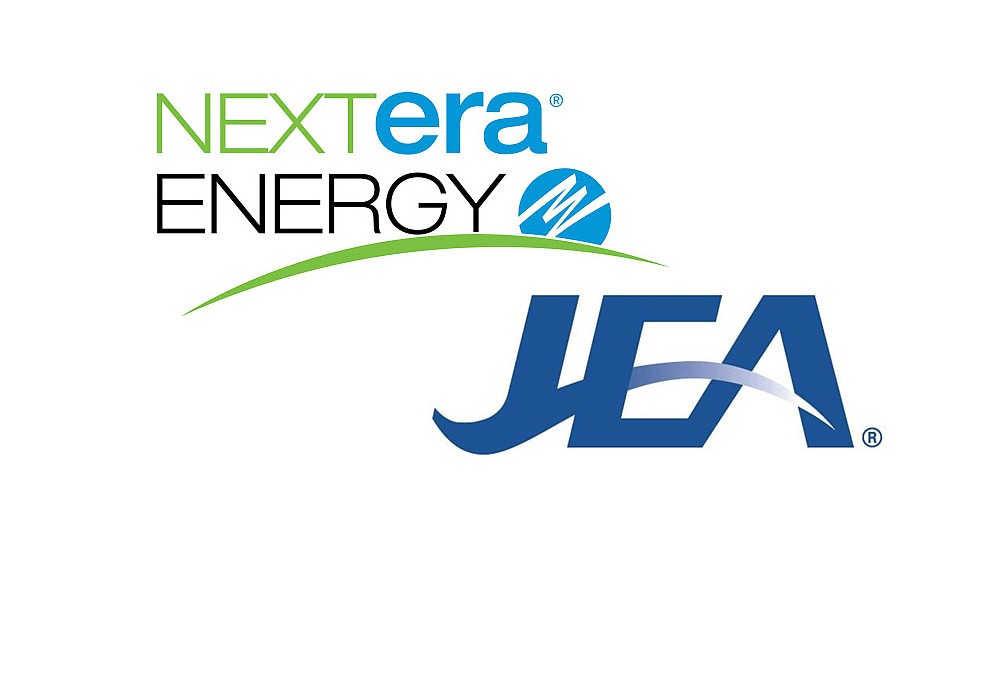
NextEra Energy Inc. bid $11.05 billion to purchase JEA during last year’s attempt to privatize Jacksonville’s municipal utility, according to the city Office of General Counsel.
City attorneys released the Florida Power & Light Co. parent’s proposed purchase price after Florida 4th Judicial Circuit Judge Virginia Norton issued a final judgment Aug. 26 in favor of JEA and the city in NextEra’s civil suit to keep the bid amount and other information out of the public record, claiming trade secrets.
Norton said in her final order that NextEra is not entitled to injunctive relief in its claim and stated the initial gross and net proceeds “are not exempt from public disclosure or public records.”
NextEra was joined by two other JEA bidders, Duke Energy Corp. and American Water Works Company Inc., in the suit.
City Assistant General Counsel Kyle Gavin confirmed in an email Aug. 26 to the Daily Record that the city would have received $6.452 billion in net proceeds if JEA’s sale to NextEra had been completed. This is the amount remaining after JEA’s outstanding debts were satisfied.
In an email Aug. 26 to the City Council’s special investigatory committee, which is conducting a probe into JEA’s failed invitation to negotiate, city General Counsel Jason Gabriel and Gavin said the court found in favor of JEA on all counts.
“This effectively ends the case as NextEra waived its appellate rights. The only thing that remains is NextEra’s filing of a redacted transcript of the trial,” Gavin said. “So, unless someone challenges NextEra’s redactions, the case is over.”
Norton gave NextEra 15 days from the day the company receives the order to produce the final redacted transcript before it is published.
The redactions will be allowed for anything the court agrees is proprietary information and trade secrets.
“We can now publish NextEra’s gross proceeds and net proceeds bid numbers. However, we cannot publish the ‘other’ redacted information at this time,” Gavin told the Council committee. “I asked NextEra (and Duke Energy) to review the ‘other’ redacted information and to unredact it. I am still waiting on a response to this request.”
NextEra is one of 16 private utility companies that bid on JEA’s invitation to negotiate last year — a process ended by JEA’s board of directors Dec. 24 after public and Council scrutiny.
Selling JEA could have given the city a one-time cash windfall that Mayor Lenny Curry proposed in August 2019 be used to pay off all the city’s outstanding debt and put the remaining money into a “lockbox” with interest becoming another revenue source for the city.
JEA provides an annual contribution to the city’s general fund, expected to rise to about $120 million in fiscal year 2020-21.
PUP proceeds
The city’s more than $6 billion in profit from a NextEra sale shows how much money JEA’s former senior leadership team, including fired former CEO Aaron Zahn, could have earned through a failed Long-Term Performance Unit Plan tied to the sale proceeds.
A Nov. 18 memo from former Council Auditor Kyle Billy states the bonus-style incentive program could cost JEA up to $636.6 million if the city netted $5 billion from a private company.
It was the largest net figure Billy incorporated in his calculation table.
This was based on 100,000 performance units the plan intended to offer to all JEA employees for purchase at $10 each. The unit value would increase as the utility hit financial targets within a three-year cycle.
In July 2019, the JEA board authorized 30,000 units to be sold in the first payout cycle, but City Council member Ron Salem said while co-leading a Dec. 16 hearing that he saw nothing in the documents the utility provided that would have prohibited utility executives from buying the remaining units themselves or issuing all 100,000.
Zahn was fired by the JEA board for cause Jan. 28. The subsequent board of directors voted unanimously voted to fire interim Managing Director and CEO Melissa Dykes without cause April 28.
Interim CEO Paul McElroy fired the remaining members of the senior leadership team who served under Zahn.
In an Aug. 10 meeting, Council member and JEA investigatory committee member Rory Diamond called the NextEra bid numbers “the missing variable” in the former JEA senior leadership team’s incentive to ensure the utility was privatized.
“It’s the X in your algebra class for the PUP equation. So, once you know how much you can sell JEA for and what the offer was, you plug that into the performance unit plan equation and you find out home much these executives were thinking they were going to make,” Diamond said.
“And my hunch is it’s in the hundreds, and hundreds, and hundreds of millions of dollars into their pocket, and there was nothing we could do about it had we sold JEA,” he said.
The money the city would have made from the proposed NextEra-JEA transaction was on the high end of a report released in February 2018 by the outside firm Public Financial Management Inc.
The reported estimated JEA’s gross sales price would be $7.5 billion to $11 billion, depending on how the market values the utility. The report estimated the city would net $2.9 billion to $6.4 billion.